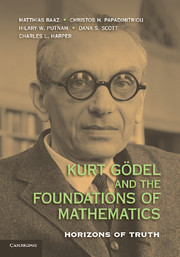Book contents
- Frontmatter
- Contents
- Contributors
- Foreword
- Preface
- Acknowledgments
- Short Biography of Kurt Gödel
- I Historical Context: Gödel's Contributions and Accomplishments
- Gödel's Legacy: A Historical Perspective
- The Past and Future of Computation
- Gödelian Cosmology
- II A Wider Vision: The Interdisciplinary, Philosophical, and Theological Implications of Gödel's Work
- Gödel and the Mathematics of Philosophy
- Gödel and Philosophical Theology
- Gödel and the Human Mind
- 15 The Gödel Theorem and Human Nature
- 16 Gödel, the Mind, and the Laws of Physics
- III New Frontiers: Beyond Gödel's Work in Mathematics and Symbolic Logic
- The Realm of Set Theory
- Gödel and the Higher Infinite
- Gödel and Computer Science
- Index
16 - Gödel, the Mind, and the Laws of Physics
Published online by Cambridge University Press: 07 September 2011
- Frontmatter
- Contents
- Contributors
- Foreword
- Preface
- Acknowledgments
- Short Biography of Kurt Gödel
- I Historical Context: Gödel's Contributions and Accomplishments
- Gödel's Legacy: A Historical Perspective
- The Past and Future of Computation
- Gödelian Cosmology
- II A Wider Vision: The Interdisciplinary, Philosophical, and Theological Implications of Gödel's Work
- Gödel and the Mathematics of Philosophy
- Gödel and Philosophical Theology
- Gödel and the Human Mind
- 15 The Gödel Theorem and Human Nature
- 16 Gödel, the Mind, and the Laws of Physics
- III New Frontiers: Beyond Gödel's Work in Mathematics and Symbolic Logic
- The Realm of Set Theory
- Gödel and the Higher Infinite
- Gödel and Computer Science
- Index
Summary
Gödel appears to have believed strongly that the human mind cannot be explained in terms of any kind of computational physics, but he remained cautious in formulating this belief as a rigorous consequence of his incompleteness theorems. In this chapter, I discuss a modification of standard Gödel-type logical arguments, these appearing to strengthen Gödel's conclusions, and attempt to provide a persuasive case in support of his standpoint that the actions of the mind must transcend computation.
It appears that Gödel did not consider the possibility that the laws of physics might themselves involve noncomputational procedures; accordingly, he found himself driven to the conclusion that mentality must lie beyond the actions of the physical brain. My own arguments, on the other hand, are from the scientific standpoint that the mind is a product of the brain's physical activity. Accordingly, there must be something in the physical actions of the world that itself transcends computation.
We do not appear to find such noncomputational action in the known laws of physics, however, so we must seek it in currently undiscovered laws going beyond presently accepted physical theory. I argue that the only plausibly relevant gap in current understanding lies in a fundamental incompleteness in quantum theory, which reveals itself only with significant mass displacements between quantum states (“Schrödinger's cats”). I contend that the need for new physics enters when gravitational effects just begin to play a role. In a scheme developed jointly with Stuart Hameroff, this has direct relevance within neuronal microtubules, and I describe this (still speculative) scheme in the following.
- Type
- Chapter
- Information
- Kurt Gödel and the Foundations of MathematicsHorizons of Truth, pp. 339 - 358Publisher: Cambridge University PressPrint publication year: 2011
- 5
- Cited by



